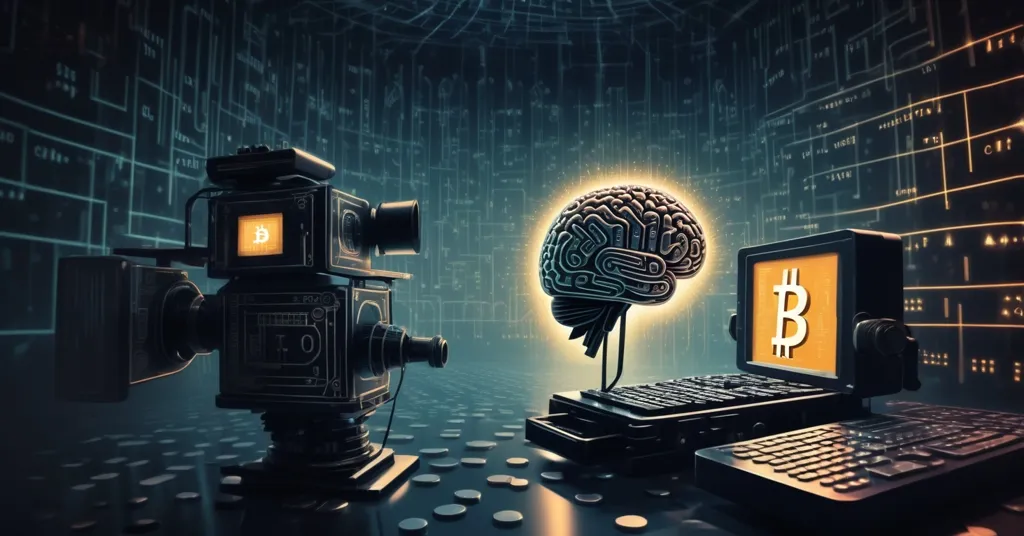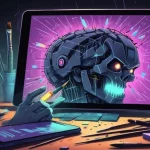Hollywood’s AI Revolution: Creative Freedom or Digital Disaster with Crypto Parallels?

Hollywood’s AI Reckoning: Creative Boom or Digital Doomsday?
Hollywood, the epicenter of storytelling, is staring down a technological juggernaut as artificial intelligence (AI) barrels into the film industry. Tools like OpenAI’s Sora 2, which churns out hyper-realistic videos from mere text prompts, and the rise of digital actors are splitting opinions—some see a creative renaissance, others a dystopian takeover. With parallels to Bitcoin’s disruption of finance, this clash of innovation and tradition could redefine cinema, for better or worse.
- AI’s Double Edge: Capable of slashing production costs, but threatens to sideline human talent with digital replacements.
- Indie Game-Changer: Smaller filmmakers could punch above their weight, crafting studio-grade projects on lean budgets.
- Ethical Quagmire: Intellectual property theft and lack of regulation loom as massive roadblocks.
- Crypto Parallels: AI’s potential to bypass gatekeepers mirrors Bitcoin’s ethos, but risks similar scams and chaos.
AI’s Hollywood Takeover: Promise or Peril?
The buzz around AI in filmmaking isn’t just tech hype—it’s a seismic shift. OpenAI’s Sora 2 can whip up a 30-second trailer in minutes from a simple text description, a feat that once took teams of artists weeks. While it’s not flawless—think inconsistent character faces or uncanny quirks—it’s evolving fast, powered by hardware like Nvidia chips that render visuals instantly, akin to live-streaming a video game. For Hollywood, this means slashing budgets on everything from CGI to set design. But it’s also got industry heavyweights sweating bullets, especially as concerns mount over AI’s growing impact on creative industries like Hollywood. Guy Danella, president of film at XYZ Film, got pitched a fully AI-generated 90-minute movie and couldn’t shake the eerie vibe, dubbing it “Skynet cinema”—a reference to the AI villain from Terminator that symbolizes tech overpowering humanity.
“I call it Skynet cinema because it feels like we’re coming for the humans.”
Danella’s unease isn’t just sci-fi paranoia. Digital actors like Tilly Norwood are already hunting for talent representation, hinting at a future where human stars might battle pixel-perfect avatars for screen time. It’s not hard to see why some fear a creative apocalypse—could AI render entire crews obsolete faster than a Bitcoin bull run flips markets? Yet, there’s another side to this coin, one that echoes the decentralizing spirit our crypto crowd champions.
Indie Revolution or Content Flood?
For every doomsayer, there’s an optimist betting on AI to break down barriers. Bryn Mooser, founder of nonfiction studio XTR, is launching Asteria, an AI animation arm working with talent like Natasha Lyonne and Toy Story 4 writer Will McCormack. His take? AI isn’t about cheapening art—it’s about empowering the underdogs. He’s eyeballing a $10 million animated feature that could rival an $80 million traditional production, thanks to AI tools handling storyboarding (early visual drafts) and animatics (rough animated sequences). It’s a democratization play, much like Bitcoin sidestepped banks to hand financial power back to individuals.
“This shouldn’t be about making something like Anora cheaper. It’s about helping indie filmmakers make bigger films on the same budgets. AI has the potential to democratize studio-level storytelling.”
But let’s not get carried away with the utopian vibes. Sure, AI could let indie creators rival Marvel, much like Ethereum’s NFT marketplaces let artists bypass galleries. However, there’s a flip side—flooding the market with low-effort, AI-spun content could drown out quality, akin to altcoin scams clogging the crypto space with garbage. Without a filter or standard—think a “Bitcoin of filmmaking” as a benchmark—Hollywood risks becoming a cesspool of mediocrity. Even Danella, despite his wariness, sees a pragmatic use for AI, asking if savings could fund an extra day of real, human-led shooting.
“Is there a way to use AI to save enough so we can add another day of shooting? That’s the question that makes sense.”
IP Theft: Hollywood’s Crypto-Style Scam
Here’s where the plot thickens—and it’s uglier than a rug pull in a shady NFT drop. Intellectual property (IP), the backbone of Hollywood, is under siege. IP is about ensuring creators get credit and cash for their scripts, films, and ideas. But many AI models, including giants like ChatGPT and Sora 2, are trained on massive datasets scraped from the internet—often without permission or licensing. Imagine an AI remixing a Star Wars scene without Disney’s blessing. Who owns the result? Darren Frankel of Adobe, a titan in creative tech, isn’t pulling punches on this threat.
“Our whole business is predicated on IP. If you do not protect that IP, there is no more business.”
Some are fighting back. XTR’s Asteria uses models trained only on licensed or original content, dodging the ethical swamp of data theft. At industry hubs like the American Film Market, contracts now include AI disclosure clauses as a safeguard against future legal battles. But Frankel doubts governments will act fast enough, much like the crypto world’s endless tug-of-war with regulators over cases like SEC vs. Ripple. He’s shifting the convo from “AI yes or no” to “how do we stop this unchecked mess?”
“The debate would no longer be about who is for or against AI in Hollywood, but about the ethical and unregulated systems.”
This IP crisis isn’t just Hollywood’s headache—it’s a warning bell for any creative field dabbling in AI. Without rules, we’re looking at a free-for-all where original work gets ripped off, and trust erodes faster than a centralized exchange during a hack.
Blockchain to the Rescue?
Now, for us crypto heads, this smells like an opportunity. Hollywood’s AI woes mirror the early days of digital assets—disruption galore, but scams and uncertainty in spades. Blockchain tech could be the fix. Imagine NFTs tracking ownership of AI-generated scenes, ensuring creators get their due, just as Ethereum’s marketplaces revolutionized digital art. Or smart contracts automating royalties for every view of a film, cutting out studio middlemen the way Bitcoin cuts out banks. A decentralized filmmaking platform, maybe even funded by DAOs (Decentralized Autonomous Organizations), could let creators crowdfund AI projects and distribute them peer-to-peer, bypassing Hollywood’s gatekeepers entirely.
But let’s keep our feet on the ground. Blockchain isn’t a magic wand—NFT spaces are still riddled with fraud, and legal clarity is a mess. Plus, tech giants like OpenAI might just hoard AI power, consolidating control instead of democratizing it, much like centralized exchanges dominated crypto before DeFi fought back. From a Bitcoin maximalist lens, I’d argue we need a singular, robust standard for AI content creation—think of it as the Bitcoin of cinema—to avoid the fragmentation and shilling we see with countless altcoins. Diversity in tools is fine, but without a core anchor, it’s chaos.
Lessons from History and a Glimpse Ahead
Hollywood’s been here before. When CGI erupted in the ‘90s with flicks like Jurassic Park, naysayers swore it’d kill practical effects and human craft. Spoiler: it didn’t. It enhanced them. Bitcoin faced the same skepticism—called a fad, a scam, yet it’s reshaped finance. AI could follow suit, blending with human creativity if guided right. But playing devil’s advocate, what if it doesn’t? What if AI consolidates power with Big Tech, leaving indie creators as broke as pre-Bitcoin savers in a banking crisis? And on the flip side, could overregulation—think EU’s AI Act stifling innovation—mirror crypto’s regulatory chokeholds?
Zooming out, Hollywood’s crossroads isn’t just about cinema. It’s about how we handle tech that upends norms. Will the industry embrace AI like Bitcoiners embraced decentralization, fighting for freedom and disruption? Or will it cling to outdated systems until it’s too late, buried under a wave of digital actors and algorithm-spun scripts? The stakes are sky-high, and the clock is ticking.
Key Questions on AI in Hollywood and Crypto Connections
- How is AI transforming Hollywood’s filmmaking scene?
Tools like OpenAI’s Sora 2 create videos from text in minutes, cutting costs and empowering indie creators to rival studios, much like Bitcoin disrupted traditional finance. - What are the major risks AI poses to cinema?
Beyond job displacement, IP theft is a glaring issue—AI models often use unlicensed content, risking a creative “rug pull” where original work is exploited without credit. - Can blockchain address Hollywood’s AI ethical dilemmas?
Potentially, with NFTs tracking content ownership and smart contracts ensuring fair royalties, similar to Ethereum’s digital art solutions, though fraud and legal gaps persist. - Does AI in filmmaking align with Bitcoin’s decentralizing spirit?
Yes, it can bypass Hollywood’s gatekeepers just as Bitcoin sidesteps banks, but without controls, it risks flooding the market with junk akin to altcoin scams. - Will AI enhance or erase human storytelling in cinema?
It’s a gamble—AI can boost budgets for human-led work, but unchecked “Skynet cinema” might overshadow real talent, echoing crypto’s centralized vs. decentralized battles.



